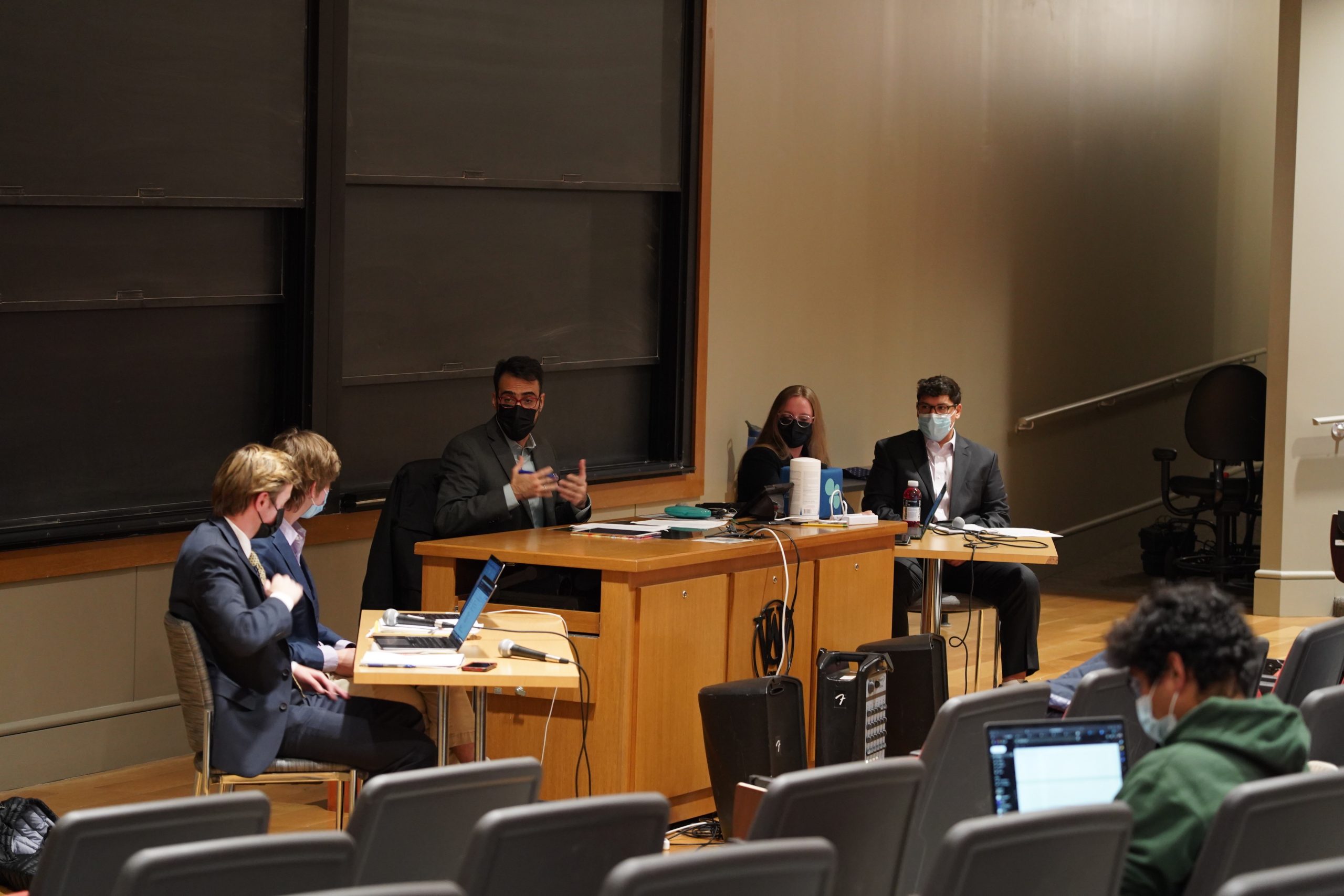News
College Democrats and Republicans debate the nation’s most pressing topics at Fall 2021 Campus Crossfire
 Jamie Nicholson | Student Life
Jamie Nicholson | Student Life Political Science Professor Guillermo Rosas moderates the 2021 Campus Crossfire debate
Around 100 students gathered in Simon Hall Nov. 3 to watch representatives from the College Republicans and the College Democrats discuss pressing topics in the United States at the annual Campus Crossfire debate.
Political Science Professor Guillermo Rosas moderated the debate and ensured that it remained civil as representatives from both groups discussed urgent topics including infrastructure, climate change, abortion, guns and vaccine mandates. Representatives from the College Democrats included freshman Gus Gerlach and senior Philip Keisler, while representatives from the College Republicans included freshman Abby McGowan and senior Sully Al-Hamdan.
In the wake of many local and federal vaccine mandates in recent weeks, vaccination requirements were a key topic during the debate.
“[The American people] can decide not to get the vaccine but then it’s only fair to allow that the governments don’t have to work with you, businesses don’t have to work with you because you’re making a conscious choice,” Gerlach said.
Al-Hamdan had a different perspective on the mandates, critiquing the decision that some cities have made employers stop offering weekly testing as an alternative to vaccination. “Vaccine mandates are good if they have options for testing in the absence of a vaccine,” Al-Hamdan said.
Rosas also asked representatives about their perspectives on President Biden’s recent withdrawal from Afghanistan. Al-Hamdan expressed disapproval of the decision.
“It’s hard to argue that withdrawal was anything but a disaster… Afghanistan was doing fine. The Taliban were under control. We had a strong military presence and he gave it all away for a political goal to withdraw by 9/11,” Al-Hamdan said.
Gerlach pivoted the discussion, condemning the United States’ initial entry into Afghanistan as “the worst foreign policy decision of the 21st century.”
Keisler added that the money spent on intervention in Afghanistan over the past twenty years, which is estimated to be nearly $2.3 trillion, could have been spent on issues like “healthcare, housing or climate change.”
As the discussion moved to the topic of abortion, representatives disagreed on when life begins and what role government should play in that decision. Keisler said that the Democratic Party “doesn’t believe in imposing restrictions on a woman’s right to choose. We believe in your fundamental right to bodily autonomy” and that the recent Texas abortion law which prohibits abortions after six weeks is “very extreme and has no place in our country.”
“Abortion bans are incredibly ineffective,” Gerlach said. “One study found that countries that have the most restrictive abortion laws have roughly the same number of abortions as the least restrictive countries. What really reduces abortions is stopping pregnancies in the first place by increasing sex education and increasing contraceptives.”
Republican representatives argued that abortions should only be used in cases where the mother or baby is medically at risk, rape or incest. Al-Hamdan added that Roe v. Wade allows states to restrict access to abortions after the second trimester, and that “science has evolved to the point where we know that life begins much earlier.”
Representatives ended the night with a discussion of gun legislation and the second amendment.
McGowan said that red flag laws, a wait period between purchase and distribution and background checks would all be effective ways in deterring gun violence, but these implementations should not impose on citizens’ second amendment rights.
Gerlach stressed that the United States needs to take further measures to address gun violence, arguing that renewing the assault weapons ban of 1994 and implementing universal background checks would be a step in the right direction.
